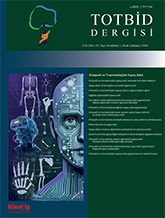
Artificial intelligence techniques, developed through machine learning and deep learning, have emerged as one of the most promising areas of innovation in healthcare, particularly in medical image analysis. In this review, we aimed to provide radiologists and orthopedists with a current perspective by evaluating machine learning and deep learning algorithms developed for musculoskeletal imaging. The number of artificial intelligence studies in the musculoskeletal imaging field has been increasing day by day in recent years, and these studies create significant advantages in clinical applications. Research in this area serves purposes such as optimizing imaging protocols, increasing workflow efficiency, automatic lesion detection and classification, automatic measurement, and predicting clinical outcomes or prognosis. The use of these technologies aims to lead to significant advancements in the field of medical imaging and to benefit patients in predicting their treatment processes and outcomes. However, suitable models for routine use in clinical practice have not yet become widespread. In the future, the development of such models is expected to bring positive changes to the workflow of orthopedists and radiologists.